With Presidents Day coming up, we’ve been thinking about the story of George Washington’s wooden teeth. In fact, George Washington had several sets of dentures, none of which were made of wood. Thankfully, today we have many more options than those available to America’s first President, including Same Day Dentures, Dental Implants, Overdentures and All-on-4 Implant Supported Dentures, many of which can be completed in as little as one day! If you are missing teeth, Morris Park Dental has a solution for you!
What were George Washington’s Dentures Made of?
America’s very first president began losing teeth even in his twenties and was finally forced to wear several sets of unattractive dentures. By the time he was admitted to the office of president in 1789, Washington only had a single natural tooth left. Dental problems plagued Washington for most of his adult life. Instead of wood, Washington’s many false choppers were made out of varying combinations of human teeth, metal fasteners and rare ivory from the hippopotamus. Ivory from elephant and walrus may also have been used, along with lead, gold metal springs, wires, and brass screws. None of these materials looked very natural, nor were they comfortable. George Washington may have also gone through a “tooth transplantation” operation, a precursor to today’s dental implant procedures.
What are Dentures?
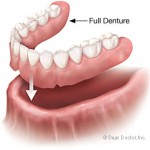 As we age, our teeth can become loose or decayed and fall out or have to be extracted. The denture is a removable plate or frame holding one or more fabricated teeth. Dentures have been around for many years, as evidenced by the story of George Washington, but today they are made of more modern materials like metal and plastic, and can be color-matched closely with any natural teeth in the patient’s mouth.
As we age, our teeth can become loose or decayed and fall out or have to be extracted. The denture is a removable plate or frame holding one or more fabricated teeth. Dentures have been around for many years, as evidenced by the story of George Washington, but today they are made of more modern materials like metal and plastic, and can be color-matched closely with any natural teeth in the patient’s mouth.
There are two basic types of dentures: Complete or Partial. A complete denture replaces a full set of teeth (top or bottom, or both), while a Partial denture is used when a patient still has some natural teeth but is missing one or more teeth.
 The partial denture usually has clasps which snap into your existing teeth. A partial denture is great, not only to disguise missing teeth, but also because it keeps your existing natural teeth from shifting, and it helps save the space from further bone loss.
The partial denture usually has clasps which snap into your existing teeth. A partial denture is great, not only to disguise missing teeth, but also because it keeps your existing natural teeth from shifting, and it helps save the space from further bone loss.
In order to make a Complete denture, the dentist takes an impression of the patient’s gums, which is used to create a mold. This mold is then used as the basis of a wax model to which the teeth are added. The model is tested in the patient’s mouth to confirm it will be suitable in size and color, and for the formation of a plate that fits snugly in the mouth. Plates made from acrylic resin are compatible with dentures that require an artificial gumline because the material can be tinted to resemble the patient’s natural gum color. Metal plates, however, carry less risk of breaking. They are also stronger and provide a better fit. This makes metal ideal for partial plates that are fully hidden behind the remaining natural teeth.
Because our office has an in-house lab, both partial dentures and complete dentures can be made in as little as one day! Other offices which send their dentures to an outside lab can take as many as five individual visits for you to get your dentures. Our motto is: Why Wait? You can get back to eating the foods you enjoy in as little as one day.
What are the Drawbacks of Dentures?
Partial and full dentures need to be cleaned daily just like natural teeth. If the cleaning is not done correctly, plaque and tartar will build up on your dentures. This will cause stains, gum problems and bad breath. Plaque from your dentures can also spread to your natural teeth and gums, leading to gum disease and dental cavities.
In addition, even if you have dentures you should still come in to see the dentist for checkups and oral cancer screenings, as well as periodic adjustments. As a person ages, their jaw bones shrink and gums recede, and the denture will no longer fit like it once did. Dentures can also break and may need to be repaired.
Finally, even with dentures that are custom fitted to your mouth, you still may experience discomfort or rubbing, difficulty eating with the denture in, and problems speaking clearly. Some people just are not happy with their dentures, no matter how many times they come in for adjustments.
What are Dental Implants?
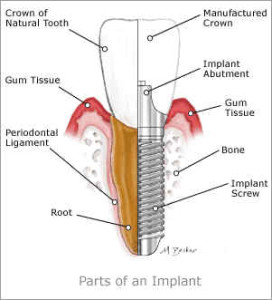 A dental implant is a relatively recent type of prosthetic device that replaces a natural tooth. Almost all dental implants in our modern world are made from titanium or titanium alloy. These are elements that have been proven over hundreds of years to be well tolerated by bone. To support replacement teeth, dental implants, for the most part, have post space or internal screw thread that allows components to be fitted. Once installed, these components provide the foundation for long-term support of crowns, bridges or dentures. You can have any number of teeth substituted with implants – ranging from one single tooth to a complete set of dentition.
A dental implant is a relatively recent type of prosthetic device that replaces a natural tooth. Almost all dental implants in our modern world are made from titanium or titanium alloy. These are elements that have been proven over hundreds of years to be well tolerated by bone. To support replacement teeth, dental implants, for the most part, have post space or internal screw thread that allows components to be fitted. Once installed, these components provide the foundation for long-term support of crowns, bridges or dentures. You can have any number of teeth substituted with implants – ranging from one single tooth to a complete set of dentition.
If you have several teeth absent with your gums and jaw are in healthy condition, you may benefit from dental implants. With outstanding oral hygiene, dental implants can last up to 20 years without the need for a substitute.
Dental implants are often a favored choice for people who have only one or two teeth missing, but they can be a great alternative to dentures if you have a full mouth of missing teeth. As long as your gums and jaw are in good form, implants can serve as a base of support for a number of replacement teeth, and can be used to support a full denture (known as an All-on-4 or Implant supported denture).
What are All-on-4 Implant Supported Dentures?
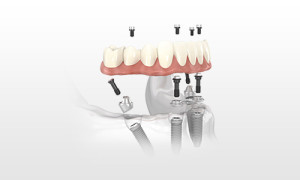
All-on-4 Implant Supported Dentures are a permanent solution for missing teeth. Unlike dentures, they do not come out of your mouth but are screwed into 4 separate implants, which hold the denture in place. All-on-4 can also be completed in as little as one day, thanks to our in-house lab.
Dental implants are a “built to last” solution. If you consult a dentist, they would say that, with proper care dental bridge can stand perhaps up to ten years. Traditionally, dental bridges on average last up to seven years, but at some point, they will require replacement. While dental implants may need occasional adjustments, they can last a lifetime when properly placed and cared for frequently over time. Besides that, you can enjoy life without being concerned about your teeth again. You can be safe assured that the removable dentures or tooth-supported replacement teeth will not be loose, even drop out when you speak, laugh or eat. Gone are the days of staying at home due to the feeling of unease in public, embarrassed because your smile looks unique from others, or worrying those missing teeth will restrict your ability to enjoy your freedom. Teeth rehabilitated with dental implants are teeth that allow you lead the life you dreamed. The third benefit you’re getting is the ease in speech. Accommodating oneself to removable dentures can mean having to put up with some struggle in pronouncing everyday words. This is not the case with dental implants, which function so alike natural teeth that you wouldn’t notice the difference.
Whether you’re considering Dental Implants or Dentures, Morris Park Dental aims to cater the highest standards of dentistry possible using state-of-the-art technology, in as little as one day. Call us today at (718) DR-SMILE (718-377-6453) to schedule your consultation today!

 One of the major benefits to having Invisalign instead of traditional braces is the way that they look. Invisalign treatment doesn’t use hardware or ugly wires on your teeth so these won’t be a problem when you smile. In fact, Invisalign is practically invisible so there will be no need to be self-conscious or shy at all. This is particularly relevant for adults who need their teeth straightened but don’t want to endure unsightly braces.
One of the major benefits to having Invisalign instead of traditional braces is the way that they look. Invisalign treatment doesn’t use hardware or ugly wires on your teeth so these won’t be a problem when you smile. In fact, Invisalign is practically invisible so there will be no need to be self-conscious or shy at all. This is particularly relevant for adults who need their teeth straightened but don’t want to endure unsightly braces.
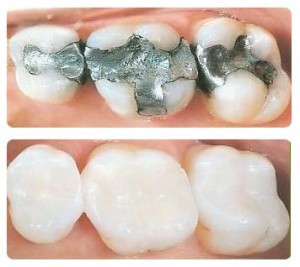
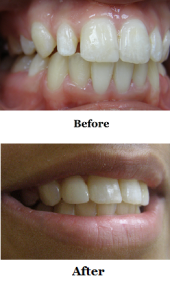

 Periodontists often treat more problematic periodontal cases, such as those with severe gum disease or a complex medical history. Periodontists offer a wide range of treatments, such as scaling and root planing (in which the infected surface of the root is cleaned) or root surface debridement (in which damaged tissue is removed). They can also treat patients with severe gum problems using a range of surgical procedures. In addition, periodontists are specially trained in the placement, maintenance, and repair of dental implants.
Periodontists often treat more problematic periodontal cases, such as those with severe gum disease or a complex medical history. Periodontists offer a wide range of treatments, such as scaling and root planing (in which the infected surface of the root is cleaned) or root surface debridement (in which damaged tissue is removed). They can also treat patients with severe gum problems using a range of surgical procedures. In addition, periodontists are specially trained in the placement, maintenance, and repair of dental implants.